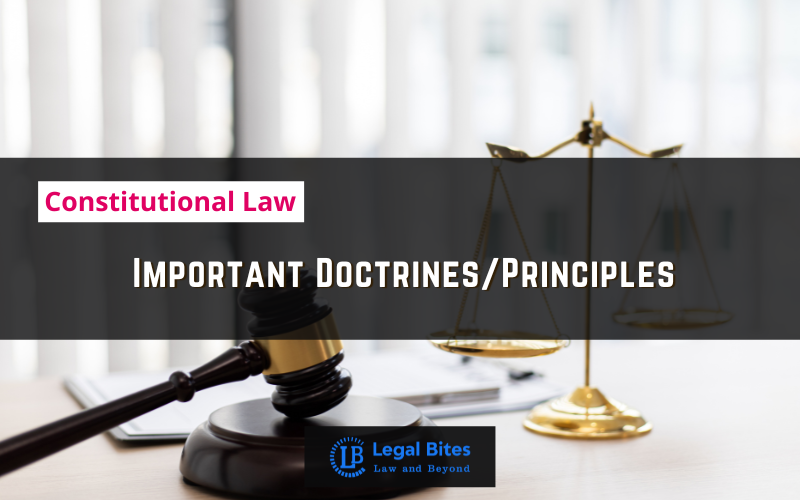Can Parliament amend Part III of Constitution of India relating to Fundamental Rights? Discuss.
Find the answer to the mains question only on Legal Bites.;

Question: Can Parliament amend Part III of Constitution of India relating to Fundamental Rights? Discuss. [UPJS 2016] Find the answer to the mains question only on Legal Bites. [Can Parliament amend Part III of Constitution of India relating to Fundamental Rights? Discuss.] Answer Parliament enacted the 24th Constitutional Amendment Act, 1971 whereby under Article 368, the Parliament was vested with the power to make an amendment to the constitution and the procedure thereof....
Question: Can Parliament amend Part III of Constitution of India relating to Fundamental Rights? Discuss. [UPJS 2016]
Find the answer to the mains question only on Legal Bites. [Can Parliament amend Part III of Constitution of India relating to Fundamental Rights? Discuss.]
Answer
Parliament enacted the 24th Constitutional Amendment Act, 1971 whereby under Article 368, the Parliament was vested with the power to make an amendment to the constitution and the procedure thereof. However, Parliament has limited power to amend the Constitution. The Parliament cannot damage the basic structure of the Constitution i.e. the guaranteed fundamental rights under Part III of the Constitution. Article 368 does not provide the power to the parliament regarding the Amendment in Part III of the Constitution and the Parliament by amending Article 368 cannot increase its Amendment powers.
The question of whether fundamental rights can be amended under Article 368 first came into consideration in the Shankari Prasad v. Union of India, 1951 AIR 458. In that case, the validity of the 1st Constitutional Amendment which added Articles 31-A and 31-B of the Constitution was challenged. It was contended that though it may be open to Parliament to amend the provisions in respect of the fundamental rights, the amendments would have to be tested in the light of the provisions contained in Article 13(2) of the Constitution.
The Supreme Court, with a bench of five judges, unanimously rejected the contention that in so far as the First Amendment took away or abridged the fundamental rights conferred by Part III it should not be upheld in the light of the provisions of Article 13(2).
Later, the extent of the power of the Parliament to amend under Article 368 was discussed in the landmark judgment of Kesavananda Bharati, (1973) 4 SCC 225, where the Supreme Court discussed the Basic structure Doctrine. The majority bench held that there are inherent limitations on the amending power of the Parliament and Article 368 does not confer power so as to destroy the Basic Structure of the Constitution.
In Minerva Mills v. Union of India, 1980 AIR 1789, the Parliament, through the 42nd Constitutional Amendment Act, 1976, attempted to circumvent Kesavananda Bharati by making Parliamentary power unlimited. It indirectly declares that there is no limitation on the power of the parliament regarding the Amendment. The Court in this case struck down the amendment on the grounds that the judicial review of Parliamentary enactments and the limitation of Parliamentary power to amend the Constitution are part of the basic structure of the Constitution.
However, it was not until much later that the Supreme Court ruled on the question of whether an addition to the Ninth Schedule would make the listed statute immune from the requirement of not infringing on a fundamental right. In I. Coelho v. State of Tamil Nadu, Appeal (civil) 1344-45 of 1976, the court held that all laws were subject to the test of being consistent with fundamental rights, which are a part of the basic structure. Therefore, it can be said that:
- Parliament has limited powers to amend the constitution.
- Parliament cannot damage or destroy the basic features of the Constitution.
- The Procedure prescribed for the amendment is mandatory and any non-compliance with it will result in the invalidity of the amendment.
- Clauses (4) and (5) inserted in Article 368 by the 42nd Amendment Act are invalid because they take away the right of judicial review.
- Parliament cannot increase its amending power by amending Art. 368.
Important Mains Questions Series for Judiciary, APO & University Exams
- Constitutional Law Mains Questions Series Part-I
- Constitutional Law Mains Questions Series Part-II
- Constitutional Law Mains Questions Series Part-III
- Constitutional Law Mains Questions Series Part-IV
- Constitutional Law Mains Questions Series Part-V
- Constitutional Law Mains Questions Series Part-VI
- Constitutional Law Mains Questions Series Part-VII
- Constitutional Law Mains Questions Series Part-VIII
- Constitutional Law Mains Questions Series Part-IX
- Constitutional Law Mains Questions Series Part-X



